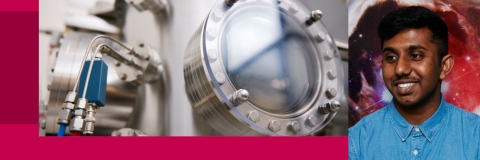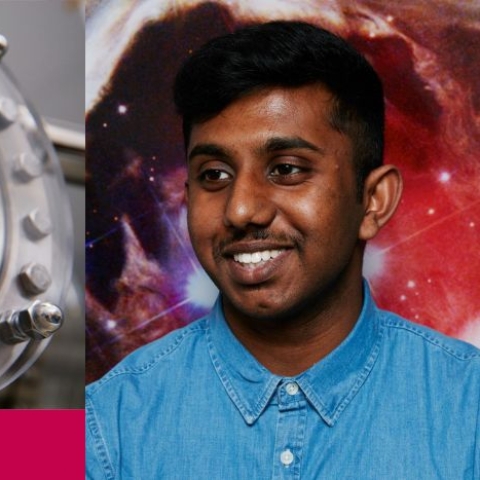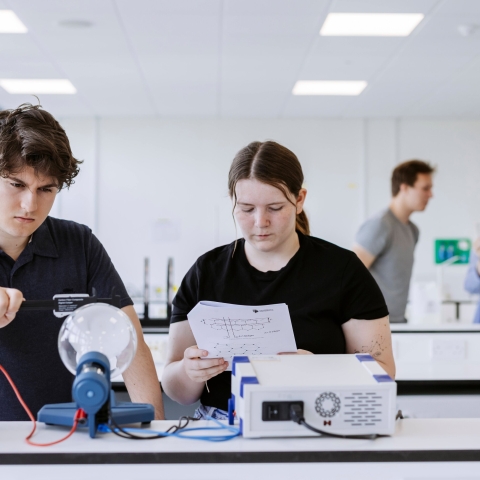
When applying to graduate roles or further study opportunities, being able to offer relevant examples of work experience will greatly enhance your chances of success.
Engaging in any opportunities available to you will boost your future applications. Options include undertaking an industrial placement as part of your degree, getting involved with specialist groups and membership to professional institutions, such as the Institute of Physics. You can also gain transferable skills, such as teamwork, leadership and communication skills through part-time work.
Overall, the key to success when looking to gain experience is to prepare thoroughly, carry out research and to organise your placement, internship or volunteering opportunity in good time.
Below are some examples of the different types of opportunities to gain experience while you study.
As part of your degree programme you may have the opportunity to take part in a salaried placement year, either in the UK or overseas to gain proven industrial experience by the time you graduate. This will provide you with an invaluable insight into working life and offer a unique opportunity to apply the knowledge and skills you are learning as part of your studies.
Placements will also enable you to gain transferable skills in the workplace, such as communication, teamwork and time management, in addition to finding out more about a specific job role or industry, which will lead to more informed decisions upon graduating. To find out more about the range of different companies and roles students in your area have previously worked with, please find out more on the placements webpage.
To find out more about sourcing and arranging your placement, we would encourage you to get in contact with your placement team.
An internship is usually a work experience opportunity that is offered for a fixed period or a limited amount of time. Internships tend to be undertaken by students and graduates who are looking to gain more relevant/industry specific skills and experience in their particular field.
These opportunities can be paid for a period of between one to four months and typically take place over the summer, with closing dates generally around January to March, but some can be earlier.
Getting involved in volunteering gives you the opportunity to develop employability skills and experience a variety of working environments. It also provides the chance to network, meet new friends and boost your confidence.
Volunteering also enables you to gain practical experience and working examples to support your graduate applications. If you choose to commit a significant amount of time and impress the organisation during your volunteering, they may also provide you with a professional reference.
Volunteer to gain practical experience
Approaching local organisations, charities or community groups who would benefit from your skills is one way of gaining that all-important experience. The competencies developed will be invaluable and enhance any speculative applications you make.
The Careers and Employability Service offers current students and graduates access to a Virtual Volunteering Bank, which provides local opportunities to undertake alongside your studies. Similarly, you can access these opportunities through the paper-based bank located in the Careers and Employability Centre.
Examples of roles previously advertised and recruited by the Volunteering Team that may be of interest to maths students and graduates include:
- STEM Ambassador with STEM Learning - acting as an ambassador of your subject area to inspire children and young people and demonstrate the possibilities of STEM subjects and careers by delivering workshops and/or activities within schools or local organisations.
- Higher Education Mentor with Brightside - communicating with mentees online through a dedicated mentoring platform to share resources, information and activities to help to raise aspirations and encourage young people to consider their education and career options.
- Funding Researcher with Portsmouth Foodbank - researching potential funding streams and compiling a report of the findings to present to the board of trustees with advice and suggestions on suitable opportunities to explore and apply for.
- Home Safety Advisor with Hampshire Fire and Rescue - acting as a representative to deliver information to fellow students and members of the community to enhance safety and tackle issues or concerns.
- Mobility Aids Spoke with the British Red Cross - dealing with wheelchair requests, entering details on a database and enabling people to return to their homes after an illness or surgery.
Be proactive and try to gather inspiration and ideas from the world around you: join creative clusters and attend networking events. This is a great way to meet people working in the creative industries and will help you with your networking skills. LinkedIn is a useful platform to network with sector employers.
You can also speak to your tutors about potential contacts and opportunities for work experience over the Easter period or summer vacation.
Where to find opportunities
Examples of companies who may offer internship and placement opportunities relevant to Physics students are listed below:
(This information has been sourced and updated from the Institute of Physics website).
Finding placements and internships in Physics
The websites below provide further information about placement and internship opportunities:
- Gradcracker - as the UK’s careers website for Science students, Gradcracker provides a search function for placements and internships relevant to your degree discipline
- Higherin - offers information on a range of internships and work experience, including finance, business, engineering, science and research.
- TARGETjobs - provides a specific section on different career sectors, with the ability to search for placement and internship opportunities in financial services, engineering, logistics, technology, science and research.
- The Big Choice - includes a search tool for work placement opportunities across financial services, engineering, information technology and public sector services.
- Milkround - provides a search tool for internships and industrial placements across sectors, including IT and related business support roles, engineering, logistics, science and telecoms.
Tips for finding work experience
Initially, it is important to identify whether or not there is specific experience you wish to gain within a particular sector or could your search be broader where you are looking to gain transferable skills?
Some key considerations for your search may include:
- Are you looking for experience that relates to a specific unit you are taking as part of your university course?
- What are your career goals and aspirations? How might the opportunity help you work towards these?
- Are there any gaps in your skillset that need to be addressed? How might an opportunity enable you to fill this gap?
- What is the time commitment and location of the role? Does this fit in with your plans and other commitments during term time or over the summer period?
- What type of organisation would you like to gain experience with? A bigger national or multinational company? A small to medium-sized enterprise, charity of not-for-profit organisation?
Make sure you carry out thorough research
Research the different potential employers who may be looking for graduates with a scientific degree and/or associated skills and expertise before you apply for work experience. Are you interested in research opportunities, teaching or consultancy? Do you have a specific goal to work within the engineering or manufacturing sector? Do project management roles, roles involving acquisition or data analysis appeal to you?
As a starting point take a look at the job profiles included on the Prospects website to consider the type of work experience recommended and the skills you will need to develop to enhance graduate applications to specific roles.
If you are aiming to carry out research about an employer, either to find out more about them, or in preparation to submit an application for a role, then don’t forget to use our helpful guide to researching an employer.
How to approach employers directly
When you approach an employer directly, you send them a speculative application. Speculative applications involve sending a CV and cover letter to an employer to ask if they can offer any work experience, even if the company is not currently advertising placements or internships.
Submitting a speculative application shows your interest in a specific company and your willingness to go above and beyond to develop your skills and understanding of the industry.










